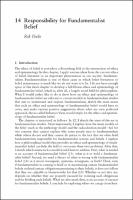Chapter 14 Responsibility for Fundamentalist Belief
Proposal review
Abstract
There are arguably moral, legal, and prudential constraints on behavior. But are there epistemic constraints on belief? Are there any requirements arising from intellectual considerations alone? This volume includes original essays written by top epistemologists that address this and closely related questions from a variety of new, sometimes unexpected, angles. It features a wide variety of positions, ranging from arguments for and against the existence of purely epistemic requirements, reductions of epistemic requirements to moral or prudential requirements, the biological foundations of epistemic requirements, extensions of the scope of epistemic requirements to include such things as open-mindedness, eradication of implicit bias and interpersonal duties to object, to new applications such as epistemic requirements pertaining to storytelling, testimony, and fundamentalist beliefs. Anyone interested in the nature of responsibility, belief, or epistemic normativity will find a range of useful arguments and fresh ideas in this cutting-edge anthology.
Keywords
Andrew Reisner; Anne Meylan; Anthony Robert Booth; belief; Clayton Littlejohn; dialogical foundationalism; doxastic dilemma; doxastic duties; Ema Sullivan-Bissett; epistemic duties; epistemic normativity; epistemic obligation; epistemic tension; epistemology; evidence; functions; implicit bias; Jennifer Lackey; Jonathan Matheson; Kevin McCain; Lindsay Rettler; Lisa Bortolotti; Luis Oliveira; Mark T. Nelson; Matthias Steup; Miriam Schleifer McCormick; obligation; open-mindedness; ought to believe; ought to reflectPublisher
Taylor & FrancisPublisher website
https://taylorandfrancis.com/Publication date and place
2020Imprint
RoutledgeSeries
Routledge Studies in Epistemology,Classification
Philosophy
Philosophy: epistemology and theory of knowledge


 Download
Download